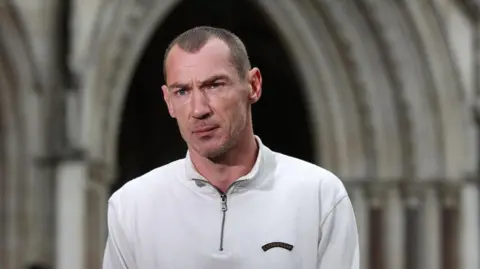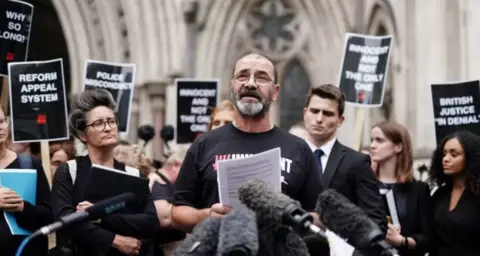
 PA Media
PA Media
Victims of historic miscarriages of justice have been told by the government they must have “bed and board” costs for the time they spent in prison deducted from their compensation payments.
Last year the Conservative Lord Chancellor, Alex Chalk, scrapped the policy of making such deductions from all future payouts.
That followed the high-profile case of Andrew Malkinson who was wrongfully imprisoned for 17 years.
The issue of past cases was left undecided.
But the government has now said people who have already had payouts cannot claim back money retrospectively.
Among those who have been told they will not be refunded money docked from their compensation payments is Paul Blackburn.
Aged 15 he was wrongfully convicted of the attempted murder of another boy and he spent 25 years in prison.
The Court of Appeal said police had fabricated evidence.
When he received compensation in 2011, more than £100,000 was deducted to cover rent and food costs he would have had to pay if he had been a free man.
Last year, after outrage over the case of Mr Malkinson, the policy of clawing back money was stopped.
Some involved in historic cases said it should apply to them too.
But the government has written to Mr Blackburn’s solicitors to say it is an established principle that changes in policy do not apply retrospectively, so he and others cannot claim back money already deducted.
Mr Blackburn says that is “morally wrong” and his solicitors may bring a legal challenge
Mr Malkinson served nearly two decades in prison for a rape he did not commit and was formally cleared by the Court of Appeal last July.
Speaking to the BBC last year, Mr Malkinson explained there were rules – originally imposed by judges in the case of men wrongly convicted of the murder of paperboy Carl Bridgewater in 1978 – which governed any financial claim he had to make.
Cousins Vincent and Michael Hickey, two of those convicted of Carl’s murder, were freed by the Court of Appeal in 1997.
Their convictions were found to have been fundamentally flawed and the then Home Secretary, Jack Straw, decided they and their co-defendant James Robinson were entitled to compensation.
Michael Hickey was awarded £1.02m and Vincent Hickey received £550,000 but, in each case, a 25% deduction was made from the section of their compensation which reflected their loss of earnings while in prison.
This was because of the living expenses they had not had to fund while in prison.
The men appealed to the European Court of Human Rights (ECHR) but the court ruled in favour of a House of Lords decision in 2007 when it was the UK’s highest court.

 PA Media
PA Media
Mr Malkinson has called for an overhaul of the jury and appeals system to give wrongly convicted people more protections.
He said that even with the living costs rule removed, he expected to wait two years for any compensation while the independent board which determined how much he was entitled to made its decision.
Calling for the system to be speeded up and requirements to be simplified, he said: “It’s a silly barrier that’s been artificially erected… it’s inexcusable. It’s not justified.”
A House of Commons library document from 2015 describes compensation as “the exception rather than the rule” in miscarriage of justice cases.








